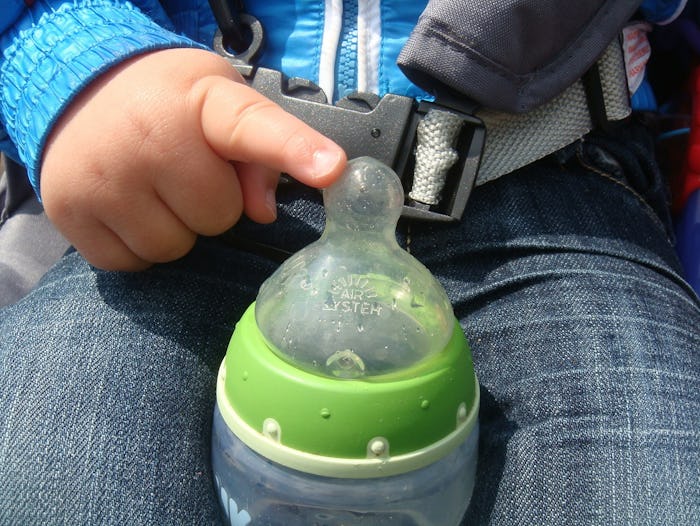You've welcomed your bouncing bundle of joy into the world, and now you're working on keeping your baby alive. Which, some days, is harder than it sounds. Nutrition is one of the most important things you'll be paying attention to while raising your child. Whether you decide not to breastfeed, or you're winding breastfeeding down, eventually, you'll be looking for alternate milk sources to keep your babe happy. While surveying your options, you might wonder, can babies have soy milk?
If you avoid dairy yourself, it might seem like a good alternative for your little one as you transition out of breast milk. However, if your baby is under 1 year old, you'll want to steer clear of filling up your baby's bottle solely with soy milk. According to the University of Michigan Health System, babies should consume only breast milk or formula during their first 12 months of life. This is because breast milk and formula are chocked full of fatty acids, in order to get all of the fatty acids, amino acids, vitamins, minerals, and other incredible nutrients they need to develop healthily. Breast milk provides superior nutrition to formula, noted the University, and is ideal for your baby's first six months of life. After six months, your baby can be weaned and switched over to a fortified infant formula, according to the University. But ideally, babies should breastfeed for a full 12 months.
Once your baby reaches between 1 and 2 years old, soy milk can be introduced into their diet, according to Baby Center. However, you need to pay attention to what kind of soy milk you're feeding your tiny tot. Pediatrician Jatinder Bhatia told Baby Center that whole soy milk is what you want to be tossing in your cart, and not the low-fat or nonfat versions that might entice you. This is because fat is incredibly important for development in children under the age of 2. If you're making the switch to soy milk, Bhatia recommended pumping your toddler's diet full of calcium-rich foods at the same time, because soy milk doesn't contain as much calcium as regular milk does. Broccoli, kale, yogurt, and cheese are all great sources of calcium to introduce into your toddler's diet while they're testing the road with soy milk.
If your child is lactose intolerant, you may turn to soy milk as a dairy supplement once they've reached the proper age. But according to What to Expect, if your child is allergic to dairy, there's a good chance they could be allergic to soy milk, too. As you do when introducing any new food and drink into your child's diet, make sure you pay attention to any reaction they may have, and seek medical attention should signs of an allergy arise.
